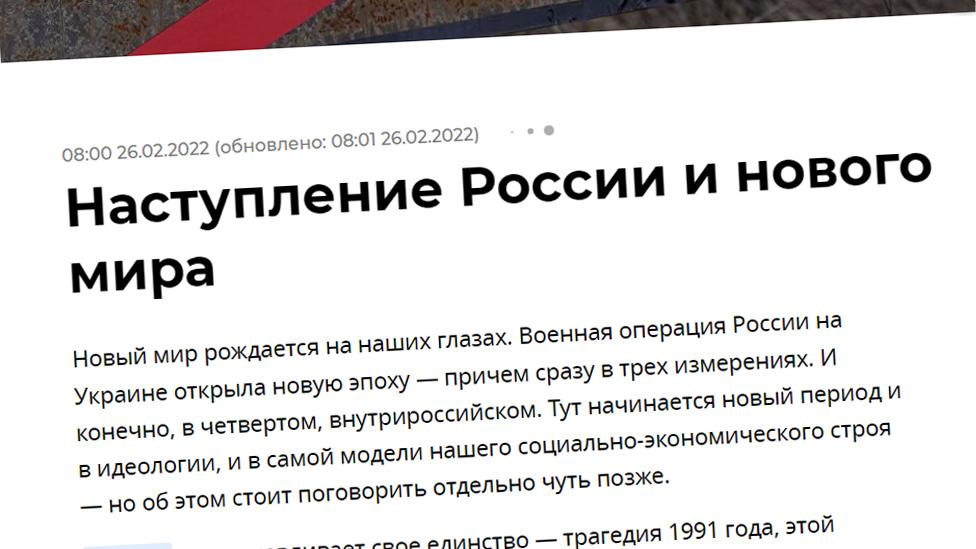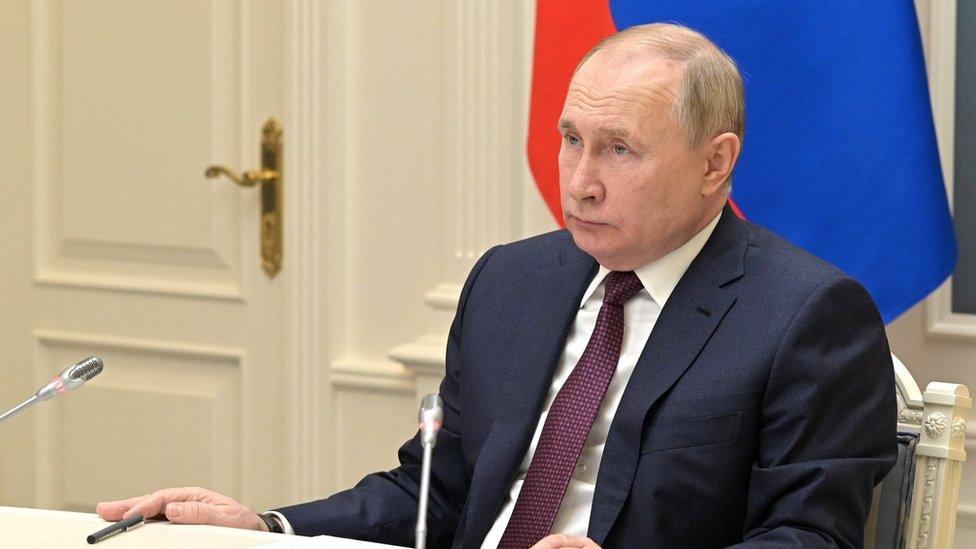Ukraine crisis: Russian news agency deletes victory editorial
- Published

The headline reads "The arrival of Russia and a new world"
A Russian news agency has published and then deleted an article prematurely praising Russia's success in invading Ukraine.
It applauds Russian President Vladimir Putin for solving the Ukraine "problem", saying that "Ukraine has returned to Russia" through military action. It suggests the author anticipated a rapid victory and the piece was published prematurely.
The article, published by the state-owned RIA-Novosti news agency on Saturday (26 February) and described by Christo Grozev of fact-checkers Bellingcat, external as "extremely shocking, even for Kremlin standards", was quickly deleted from its website.
Other Twitter users called it Russia's "victory celebration"., external
However, it still remains visible on the Internet Archive website,, external and at the time of writing it's also visible on a regional page of Russia's government-owned Sputnik news site., external
A syndicated version in English entitled "The New World Order" can also be seen on the website of Pakistan's Frontier Post., external
What's in the article?
Many Twitter users presumed the editorial piece was intended for publication after a swift Russian victory in Ukraine.
In it, contributor Petr Akopov claims that Russia is returning to lead a new world order, while making good the "terrible catastrophe" that was the end of the Soviet Union in 1991.
It is headlined "The arrival of Russia in a new world", but the Russian word for "arrival" (nastuplenie) can also mean "attack".
Mr Akopov justifies the "virtual civil war" as "Russia restoring its historical fullness, gathering the Russian world, the Russian people together".
Moscow is drawing together "Russians, Belarusians and Little Russians (Ukrainians)", he says, suggesting a Russian plan to increase its sphere of influence.
The architect of this act of reunion is, of course, Mr Putin, who is praised for taking action now, rather than leaving the situation to be resolved in the future.

President Putin was praised as a man taking 'historic responsibility'
"Vladimir Putin has assumed, without a drop of exaggeration, a historic responsibility by deciding not to leave the solution of the Ukrainian question to future generations," the article says.
It concludes by claiming that the military action "is Russia's return of its historical space and its place in the world", which has put the Anglo-Saxons of Europe and the US in their place.
"Western global domination can be considered completely and finally over," it claims.
Some claims on social media say that the timing of the article's publication - exactly 08:00 on Saturday - shows that it was planned in advance by those who thought that the war would reach a swift conclusion.

Russia attacks Ukraine: More coverage
THE BASICS: Why is Putin invading Ukraine?
ZELENSKY: Comedian president rises to the moment
IN MAPS: Tracking Russia's invasion

Change of Russian tone
The publication of this article marks a change of Russian tone on the invasion in the country's state-controlled media, mentioning its motivation of returning Ukraine to "its natural state as part of the Russian world".
But with the invasion seemingly going much slower than expected, this new narrative looks like it's been quietly shelved.
Instead, state-run media in Russia continues to tell its audiences that the invasion is a "special military operation" to support the Russian-backed rebels in the east of Ukraine, and to "de-Nazify" the country.
There's virtually no mention of casualties or military setbacks, while large chunks of TV schedules on state channels are given over to talk shows justifying military action.
Only relatively small outlets with very small audiences are reporting the reality of events, while Russia's media regulator Roskomnadzor has restricted Russian users' access to Facebook and Twitter, in what it says is a protest against "censorship" by the social media platforms.
Related topics
- Published26 February 2022
